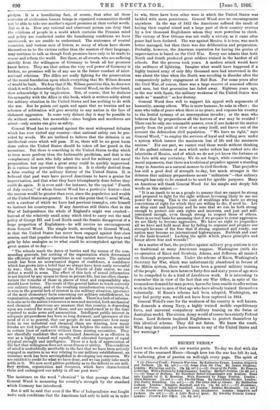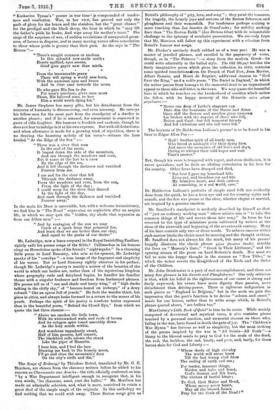RECENT VERSE.*
LAST week we dealt with our warrior poets. To-day we deal with the verse of the unarmed Muses—though here too the war has left its sad, if hallowing, glow of passion on well-nigh every page. The spirit of • (1) Flower of Youth : Poems in War-time. By Katharine Tynan. London: Sid wick and Jackson. L. ed. net.]—(2) Songs from the Clay. By James Stephens. Londog enutian and Co. Se ea. net.]—(8) Songs of the Fields. By Francis Ledwidge. With a Preface by Lord Dunsany. 'London : Herbert Jenkins. (3s.ed.net.I —(4) Songs of Bny. By Theodore Botrel (Chansonnier aux Armees). Done into English by U.E.. Morrison. With Foreword by Edgar Preston. London Elkin Mathews. [Is. net.]—(5) The Old Ships. By James Elroy Flecker. London : The Poetry Bookshop. [Is. net.]—(6) The Other Side of Silence. By Habberton Latham. London : Simpkin, Marshall, and Co. [3s. ed. net.]—(7) Brookdown, and other Poems. By Egbert Sandford. London : Erskine Macdonald. (la. net.' —(8) Swords and Ploughshares. By John Drinkwater. London : Sidgwick and Jackson. (Is. net.]—(9) d Little Book-,f Quiet. By Dorothy Frances Gurney London : Country Life Office. (•2s. ed. net.] "Katharine. Tynan's " poems in war time' is compounded of tender- ness and exultation. War, in her view, has proved not only the path of glory for the brave and the stainless, but the "great chance" for the prodigal and the black sheep, the hour in which he " may lift the father's pride he broke, And wipe away his mother's tears." She sings of the surprises of war, of sudden revelations of unexpected great- ness, of heroes in disguise, and in many moving verses offers consolation to those whose pride is greater than their pain. As she says in " The Heroes "—
" There's naught common or unclean In this splendid new-made earth t Hearts uplifted, eyes serene,
Grief-goes gayer now than mirth.
• • • • From the innumerable grave There will spring a world new-born, With the austcrest eyes and bravo And its clear gaze towards the morn.
He who gave His Son to die For man's purchase, gives once more These, His beloved sons, to buy
Him a world worth dying for."
Mr. James Stephens has many gifts, but his detachment from the concerns of humanity is disconcerting, and even uncanny. He surveys his fellow-men for the most part from the standpoint of a dweller in another planet ; and if ho is amused, his amusement is expressed in gusts of elfin laughter. His humour is freakish and sardonic, though he does not fear to indulge in it at his own expense. But with all deductions, and when allowance is made for a growing trick of repetition, there is no denying the haunting melody of his verse :—witness the lines headed " At the Edge of the Sea " :- " There was a river that rose In the cool of the morn, It leaped down the side of the mountain, And ran through the meadows and corn, But it came at the last to a cave By the edge of the sea, And it fell through the darkness and vanished Forever from me.
I am sad for the river that fell Through the darkness away, From the meadows and corn, from the sun, From the light of the day ; I could weep for the river that danced In the light of the day, And sank through the darkness and vanished Forever away."
In the main his Muse is unsociable, but, with a welcome inconsistency, we find him in "The Road" expressing an aspiration after an ampler life, 1n which we may quit the " hidden, shy abode that separates us from our fellow-men" :- " And by contagion of the sun we may Catch at a spark from that primeval fire, And learn that we are better than our clay, And equal to the peaks of our desire."
Mr. Ledwidge, now a lance-corporal in the Royal Inniskilling Fusiliers.
rightly calls his poems songs of the fields.3 Callimachus in his famous
elegy on Heracleitus spoke of his friend's " nightingales." In a charming little poem to Lord Dunsany, who acts as his sponsor, Mr. Ledwidge speaks of his " cowslips " —a true image of the fragrance and simplicity of his verses. But as Lord Dunsany rightly observes in his preface, though Mr. Ledwidge's poetry is mainly a mirror of the beauties of the -world in which our bodies are, rather than of the mysterious kingdom where geography ends and fairyland begins, he handles his familiar theme with a singular freshness and freedom from hackneyed phrases.
His poems tell us of " sun and shade and hasty wing," of " high ducks
talking in the chilly sky," of " breezes honed on icebergs," of a dewy cobweb " like an apron- full of jewels." He feels the wander-thirst, but pines in cities, and always looks forward to a return to the scenes of his youth. Perhaps the spirit of his poetry is nowhere better expressed than in the beautiful poem, " Behind the Closed Eye," from which we quote the last three stanzas :- "Above me smokes the little town, With its whitewashed walls and roofs of brown And its octagon spire toned smoothly down As the holy minds within.
And wondrous impudently sweet, Half of him passion, half conceit, The blackbird calls adown the street Like the piper of Hamelin.
I hear him, and I feel the lure Drawing me back to the homely moor, I'll go and close the mountain's door On the city's strife and din."
The Songs of Britlany,4 by Theodore Botrel, translated by Mr. G. E.
Morrison, are chosen from the chansons written before he added to his renown as Chansonnier our Armies—the title officially conferred on him
" by a War Department intelligent enough to recognize that, in his own words, ' les chansons, aussi, sent des balks.' " Mr. Morrison has made an admirable selection, and, what is more, contrived to retain a
great deal of the simple magic of the originals. In this anthology we
find nothing that we could wish away. These Breton songs give us
Botrel's philosophy of " pity, love, and song " ; they paint the romance, the tragedy, the homely joys and sorrows of the Breton fishermen and ploughmen and their womenfolk. For tenderness perhaps nothing is more touching than Les lunettes de Grand' mire ; for nobility nothing finer than " The Breton Faith " (Lea Bretons Situ.) with its indomitable challenge to the tyranny of secularist persecution. We sincerely hope that Mr. Morrison will follow up this experiment with a selection from Botrel's famous war songs.
Mr. Flecker's untimely death robbed us of a true poet. He was a master of jewelled phrases, and excelled in the pageantry of verse, though, as in " The Princess "—a story from the modern Greek—he could write admirably in the ballad style. The Old Ships,' besides the finely imaginative poem which gives the collection its ti tle, contains some spirited translationssfrom the French of Paul Fort, Jean Moreas, Albert Samain, and Henri do Regnier, additional stanzas to " God Save the King," an d a noble poem, " The Burial in England," in which the writer passes from homage to the immortal dead to an impassioned appeal to those who still loiter in the town. We may quote the beautiful lines in which he touc hcs en the brotherhood of sacrifice which unites the fallen, with its happy memory of the Homeric miro nkyat /ceyaXwa :- "Never one drop of Lethe's stagnant cup Dare dim the fountains of the Marne and Aisne Since still the flowers and meadow grass unmown Lie broken with the imprint of those who fell, Briton and Gaul—but fell immortal friends And fell victorious and like tall trees fell."
The keynote of Dr. Habberton Lulham's poems6 is to be found in his; lines to Edgar Aim Poe :—
• " Hail ! brother-spirit of all lonely men, Who brood at midnight o'er their dying fires, And nurse the memories of old loves and days, Daring to whisper their wild hopes and wait Time's answer."
But, though his verse is tempered with regret, and even disillusion, it is never querulous, and he finds an abiding consolation in his love for the country. Other loves have drooped and died, " But love I gave my homeland hills Lives yet, and broadens out and fills My homeless heart, and doth endure As something, in a sad world, sure."
Dr. Habberton Lulham's portraits of simple rural folk are evidently done from the quick, he has a keen eye and ear for country sights and sounds, and the few war poems at the close, whether elegiac or martial, are inspired by a genuine emotion.
Mr. Sandford's standpoint is modestly described by himself as that of " just an ordinary working man " whose artistic aim is " to take the common things of life and weave them into song." In form ho has reverted to the type of miniature poem cultivated by writers at the close of the sixteenth and beginning of the seventeenth century. Many of his lines contain only two or three words. To achieve success within such narrow limits the choice must be unerring and the thought striking. htr. Sandford does not always hit the mark, but many of his poems% happily illustrate the classic phrase xdpa flatacnv draci, notably the lines on " Memory's Gate," " Great in Their Littleness," and tho opening stanza of the poem on Lord Roberts's death. or must wo fail to note the happy thought in the stanzas on " New Titles," in which the writer covets the Knighthood of the Birds and tho Order of the Children.
Mr. John Drinkwater is a poet of real accomplishment, and there aro many fine phrases in his Swords and Ploughshares.8 Our only criticism is that, while his belief in the righteousness of our cause is strong and finely expressed, his verses have more dignity than passion, moro detachment than driving-power. There is righteous indignation in such pieces as " England to Belgium," but in the main we gain the impression that the poet's function is to devise " solemn and sweet " music for our heroes, rather than to write songs which, in Botrel's. phrase quoted above, " are bullets too."
Miss Gurney's Little Book of quiet 9 is true to its name. While mainly composed of devotional and mystical verse, it also contains pieces touched by a personal emotion, and memorial stanzas on those who, falling in the war, have found in death the gate of joy. The " Children's War Hymn" has fervour as well as simplicity, but the most striking of the poems inspired by the war is " All Saints—All Souls "—a litany to the blessed saints to pray to God for the souls of the dead, the evil, the luckless, the sad, lonely, and poor, and, lastly, for those heroes slain for God and Liberty :—
" Whose deeds of high chivalry The world will never know Till the last trump shall blow The ending of earth and sea ; For tender, innocent things, Maiden and babe and beast, God's dearest and His least, The victims of lustful kings ; To God, their Maker and Head, Whose mercy never faints, May all the blessed Saints Pray for the Souls of the Dead l e



































 Previous page
Previous page